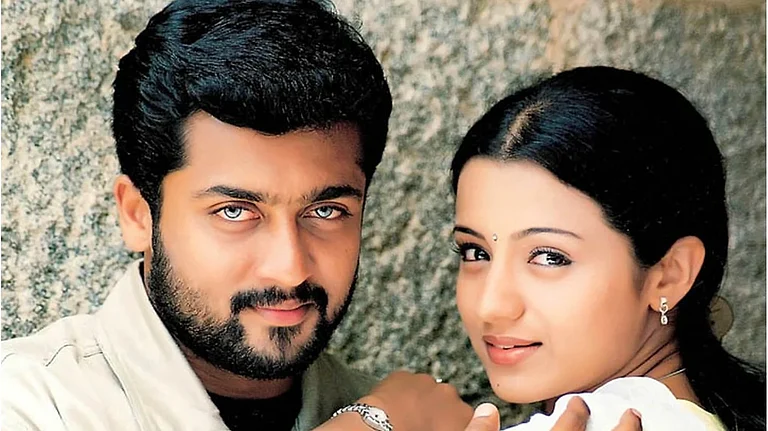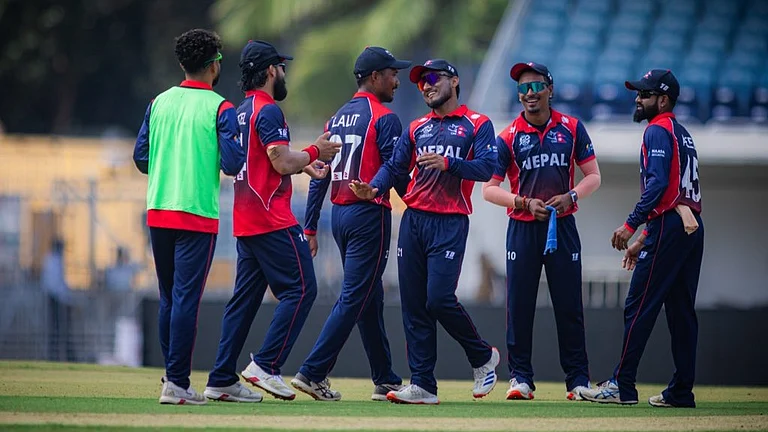They suddenly emerge from nowhere, five men and a woman, one after another, willing to gamble their liberty for the cause of democracy. They are here to tell the world that Nepalis do oppose King Gyanendra's decision. A police officer jumps on the first protester. He is throttled as he screams, "Rajshahi murdabad (down with king's rule)." They drag him to the police van. Then yet another person emerges; he's meted the same treatment. The woman shouts, "Our rights are our life." She's arrested as well. From the group of journalists emerges one shouting, "Long live democracy." A youngster watches these six warriors of democracy with admiration. "They would definitely be beaten up; they could even disappear," he says.
This then is democracy's lost kingdom. Nepal is now a military state. Gun-toting men of the RNA have been patrolling Kathmandu from the day King Gyanendra imposed Emergency. They marched autocratically into newspaper offices and ordered editors what they could publish. And it's they who arrested innumerable political activists, and it's they who guard the monarch from his people's wrath.
Sure, Kathmandu doesn't echo with that slogan from the past: "Gyane chor, desh chhod; Paras goonda rukme jhunda; hatyara Gyane murdabad (crook Gyane flee the country; hang goon Paras from the tree; down with killer Gyane)." But make no mistake, this is the peace absolute monarchs secure at gunpoint. You understand this as you drive around in Kathmandu, as you talk to people: the discontent against the king is simmering below the city's calm veneer. Even the mode of protest has changed to evade police crackdown. I understand this as soon as I visit the Shanker Dev campus affiliated to Tribhuvan University (TU).
Here students watch a mock football match on the basketball court. Life couldn't have been more normal. Then your gaze falls upon a notice pasted on a pillar. It calls for 'blood donation' on the eve of 'Democracy Day', a couple of weeks hence. Students can interpret the notice variously: bloodletting on the eve of what is a day of significance? A call for bloody resistance? A prank? They insist it's political activism, pointing to the posters on the walls denouncing the king, to bolster their case.
Signs of resistance have surfaced elsewhere too. The Nepali Congress (NC) and the Communist Party of Nepal (United Marxist Leninist) have reportedly held secret meetings to launch an agitation soon. And the Maoists are reported to have given a call for an indefinite strike from February 13. Nepal could still spin out of control.
Censorship, as of now, has been Emergency's most visible consequence. The radio has suffered the most. As the publisher of the Himal Media group, Kanak Mani Dixit, explains, "Radio was our greatest achievement. For just Rs 140, anyone could buy a Chinese radio with FM and get news even on remote hill tops. Even the Maoists had their stations. It helped us know their point of view." Dixit, who has been dubbed a royalist for accepting the official version of the 2001 palace massacre, feels the monarch has mistaken the integrity (or the lack of it) of politicians for principles of parliamentary democracy. Nepal is consequently a loser, he argues."Our democratic institutions were getting strengthened.But 15 years of learning is now getting lost. Once I told the king that even George Bush is not a good politician. Hence don't equate politicians with parliamentary democracy." As he talks, we hear the deafening clatter of a helicopter. Dixit looks out of his glass-panelled office. He mutters, "Helicopter means bad news, it means action."
But the biggest fear Dixit and others have is of losing what they call "the middle ground". On the two extremes of Nepal's political theatre are the Maoists and the king who represents the elite, the army and the industry. Between them is the vast middle ground occupied by the squabbling political parties—NC, the mainstream Communists and their splinter groups. Gyanendra's rule could see the two extremes completely swamp the middle ground. Says NC spokesman Arjun Narasingh, who is willing to give the king another chance (no wonder, he hasn't been arrested), "Without political institutions, there would be a complete polarisation, forcing people to choose between the king and the Maoists."
Nepal's politics anyway is a bewildering paradox. Here Communists support constitutional monarchy, royalists become democrats and just about all forget their slogans as soon as they come to power. For instance, middle-ground politicians may shout anti-India slogans and yet plead for their children's admission to educational institutes in India. In power, they become pro-India overnight. That's why they have lost all credibility, leave aside their endemic squabbles.
Post the royal massacre in June 2001, though, the anti-India sentiment in the politician's language was replaced by anti-king rhetoric. The colours changed yet again at the first smell of power. Once Parliament was dissolved in 2002, Gyanendra appointed and dismissed four governments. Politicians shamelessly jockeyed for power; the middle ground was not only sullied but also fractured.

Royalists say the politician cited the Maoist insurgency to postpone elections and rule without Parliament. As a palace sympathiser points out, "Emergency light has to go on when the regular power supply fails. That's what happened in Nepal. Political instability made the Maoists powerful. The army would now give the Maoists a decisive knock, and bring them to the negotiating table." This is the sentiment echoed by professionals, civil servants and businessmen who are wary of instability hurting their bottomlines.
But even they agree Gyanendra isn't popular; that should he fail to check the Maoists, the people could turn against him. They are obviously mistaking the peace of the graveyard for political stability. Take the TU campus, which remains quiet. As one student said, "What do we gain by burning tyres? We are waiting for a message from our leaders. Once we receive the message, we would plunge into a total agitation to get rid of the king." The 25 others around him agree readily.
These students sympathise with the Maoists but abhor their violent methods. They are also desperate to retrieve the middle ground, believing that there does exist a meeting point for mainstream politicians and the Maoists. And what's that? The two, they say, should come together on the agenda of convening a constituent assembly and ushering in a republican form of government and abolishing the monarchy. Unlike the elite, they believe the king usurped the throne by organising the royal massacre of 2001, that he always favoured absolute monarchy. As proof of their dislike for the monarchy, one of them cites statistics: "In a referendum just five months back, 92 per cent of TU voted for a republican form of government. In many universities, republicans polled 99 per cent."
Interestingly, the visiting Indian is no longer ugly.Students, human rights activists and journalists want India's "support and goodwill"; they welcome India's decision to pull out of the saarc as it denied Gyanendra the legitimacy he was looking for. They want New Delhi to help them fulfil their dream of a republic. But then Gyanendra is also looking at India for help. In return, he could finish off the Maoists and help dam the rivers that flood India. Who will India listen to?
























